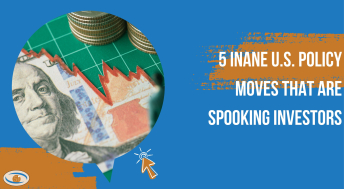A publisher once approached me several years ago to write a book about investments. I wasn’t so keen to do so, because I have four kids, thus have no time, and there are so many good investment books out there already. But had the publisher wanted some stories about my time in the investment industry, rather than a textbook-style “How to Invest” book, now that would be a different thing altogether — stories I can do.
The Briefcase Full of Cash
One of my first gigs in the investment world was working at a discount broker. Hard to believe, but trading commissions used to be regulated. You might pay $200 to buy a couple of hundred shares of a blue-chip stock. But deregulation changed all that, and discount brokerages popped up everywhere.
Since my company was new, employees were tasked with doing everything, from trading to client services to accounting — you name it. One day, back in the late 1980s, I was working in client services, opening new accounts. A new client came in wanting to set up an account. Pretty standard stuff. But when I asked how he wanted to fund the new account, he opened up his briefcase and took out $40,000 in cash. I had to explain to him our company did not accept cash. He left, disappointed, but came back days later with a cheque. Then, once the cheque cleared, he made one trade, putting the entire amount into Falconbridge Ltd. call options.
Even back in the crazy go-go ’80s, this seemed suspicious, so, of course, we flagged the trade to regulators. Sure enough, Falconbridge received a takeover offer about two weeks later, and the client’s account soared in value. The client took out his giant profits, and I never heard from him or the regulators ever again.
Peter, Your Fund is Up Too Much
Once, as a fund manager, I was having a really good year. All my stock picks seemed to be working, the small-cap sector was soaring and I was clearly on a roll, as managers tend to be once in a while.
One day, in October of that great year, my boss called me in for a meeting. I was expecting a big bonus, promotion or, at worst, a nice pat on the back and kudos for a job well done. But what I got floored me: My boss was not happy. He explained that if my fund could go up by so much, then client investors likely expected it to go down a lot, too, and he didn’t like the implied perception of volatility.
I explained to him my job was to make investors money, and I was pretty sure I had done it very well that year. But he explained his job was to keep the money at the company. Mutual fund volatility interfered with that goal. Flabbergasted, I left early in the next year.
The Compliance Officer Who Robbed Banks
Compliance officers, as you likely know, are the police force of the investment industry. They make sure brokers follow the rules and clients are protected. It is a highly important role, and, of course, has become more and more important as product complexity increases and frauds of various forms, unfortunately, continue.
That helps explain why the Street was in shock when a well-known brokerage in 2008 announced its compliance officer had been arrested (and later convicted) for robbing banks during his lunch hour. The robber was making far more than $100,000 annually, and likely received nice fat bonuses as well. His 10 convictions only resulted in $33,000 of robbery proceeds.
Prior to his arrest, however, his broker colleagues printed a robbery surveillance picture the police had sent out and posted it on his office door, with a joking note saying, “Hey, Kevin, this guy kind of looks like you.” The joke wasn’t so funny, after all.
The Brokerage that Went Bankrupt While the Sales Guy is Taking Me to Dinner
Part of a brokerage salesperson’s role is wining and dining clients. I was on the receiving end of this one night in 2011 with a broker I respected and admired, but most of all trusted, which can be a bit rare. We were enjoying a nice dinner when he got a text and suddenly went white. His brokerage had gone bankrupt while we were out for dinner.
It turned out one of the company’s stock traders had made a trading error, and then tried to trade his way out of it. Any investment professional knows this is a recipe for disaster. Mistakes have a way of compounding, and rogue traders have taken down giant international banks before. Now, this was just a small Canadian brokerage, but it was, as Monty Python would state, “No more.” My broker friend was clearly upset, and, not knowing if his business credit card would even work, I paid for dinner.
The Millionaire who Argued for $5,000 Extra
As I moved up in the investment world ranks over the years, I received more and more responsibility. Many times, I was part of a small group that allocated bonuses to staff. It was not a role I relished: there were so many factors, most bonuses were completely subjective, and you could never — ever — make everyone happy. But one event really turned me off.
One year, after dividing the bonus pool among everyone, which took hours and hours, we had $5,000 left over. I argued it should go to one particular administration employee who worked hard, never complained and always had a smile on her face. A $5,000 bonus would have been huge for her, and would have made a clear statement she was a valuable asset to the company.
But another member of the committee argued he should get it, going into the deals he had made that year and his contribution to the company. But, as a mover and a shaker, he was compensated extremely well. We had already set out his own bonus, and it was big. An extra $5,000 for him would have not even have been noticed, whereas it was a material amount for the other employee. I could not stand the greed displayed in that room at the time, and the event gave me a bad taste for the whole industry (the executive got the $5,000).
Take Care & Happy Holidays







Comments
Login to post a comment.